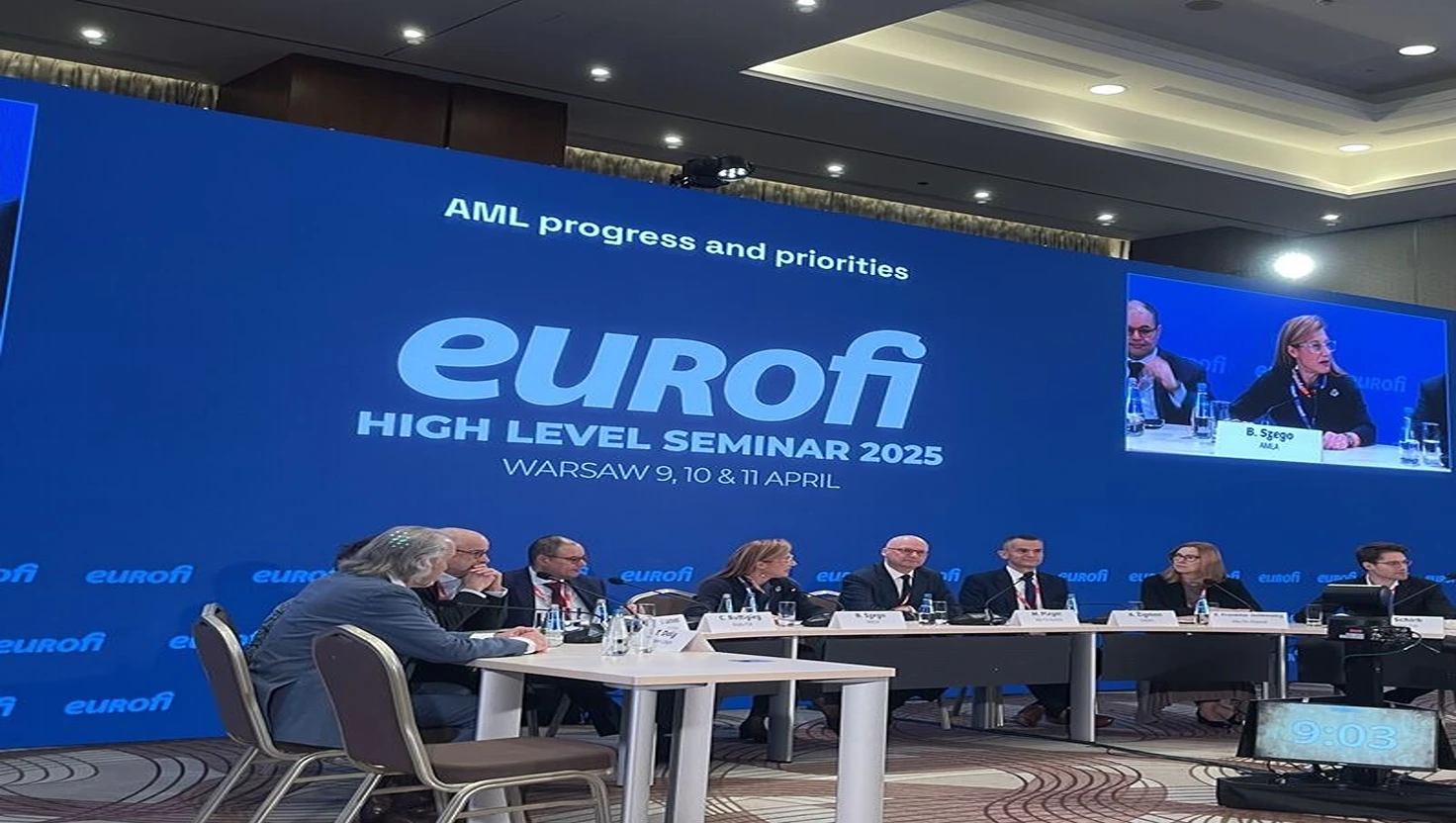EU Anti-Money Laundering Authority Warns Crypto Businesses

EU Anti-Money Laundering Authority Warns Crypto Businesses
The EU's new Anti-Money Laundering Authority warns cryptocurrency firms of upcoming regulations aimed at combating financial crime.
The European Union's Anti-Money Laundering Authority (AMLA) has issued a cautionary notice to officials and virtual asset service providers, including cryptocurrency exchanges and custodial wallet operators. This advisory aims to prepare these entities for compliance with stringent new regulations designed to mitigate money laundering and terrorist financing risks associated with the sector.
Bruna Szego, the chair of AMLA, emphasized the importance of the European bloc ensuring sufficient protection against financial crimes linked to cryptocurrency activities. "It is essential that the bloc is adequately protected from the risks of money laundering and terrorist financing stemming from this sector," Szego stated.
The Frankfurt-based authority officially began operations at the start of October 2023. It is tasked with ensuring that the 27 EU member states adhere to a comprehensive set of anti-money laundering regulations. According to Szego, one of the key obligations for regulators will be to evaluate the beneficial ownership of cryptocurrency service providers. This assessment includes determining who the shareholders are and their locations.
"We need to be sure the owners are not involved in money laundering or terrorism finance," Szego explained in an interview with The Financial Times. She also highlighted specific anti-money laundering challenges facing the European cryptocurrency market, including inconsistent regulatory controls among various member states and a fragmented market, where numerous companies are seeking approval under the EU’s Markets in Crypto-Assets (MiCA) framework. Szego noted the risks posed by the varying application of these regulations by national authorities.
Anna Holmes, a senior associate in the criminal litigation team at the UK law firm Kingsley Napley, underscored the importance for legitimate cryptocurrency companies to prepare for AMLA's regulatory requirements in each jurisdiction in which they operate. "These requirements may differ depending on the specific EU country," Holmes remarked, indicating that the regulatory landscape can be complex.
Holmes also noted that AMLA's stern stance on anti-money laundering for cryptocurrencies aligns with the stringent approach taken by national regulators, such as the UK's Financial Conduct Authority (FCA).
Under the new European Union regulations, cryptocurrency service providers will face significant restrictions. Specifically, they will be barred from engaging with anonymous wallets and privacy coins. Moreover, these virtual asset service providers (VASPs) are required to provide direct, immediate, and unfiltered access to their account information for government agencies, including the various Financial Intelligence Units across Europe and the AMLA itself. This comprehensive set of rules is slated to come into full effect by July 2027.
Cryptocurrency firms operating within Europe are no strangers to scrutiny over compliance with anti-money laundering laws. For instance, in July 2022, Binance—a major cryptocurrency exchange—faced a fine of €3.3 million from the Dutch central bank due to its failure to comply with AML registration protocols. Additionally, French authorities have initiated an anti-money laundering investigation into Binance as of January 2025, amid allegations involving terrorist financing, drug trafficking, and tax fraud.
As the EU looks to tighten its grip on cryptocurrency regulation, AMLA's latest advisory serves as both a warning and a guide for firms navigating this evolving landscape, ensuring they are equipped to operate within legal boundaries.
Bruna Szego, the chair of AMLA, emphasized the importance of the European bloc ensuring sufficient protection against financial crimes linked to cryptocurrency activities. "It is essential that the bloc is adequately protected from the risks of money laundering and terrorist financing stemming from this sector," Szego stated.
The Frankfurt-based authority officially began operations at the start of October 2023. It is tasked with ensuring that the 27 EU member states adhere to a comprehensive set of anti-money laundering regulations. According to Szego, one of the key obligations for regulators will be to evaluate the beneficial ownership of cryptocurrency service providers. This assessment includes determining who the shareholders are and their locations.
"We need to be sure the owners are not involved in money laundering or terrorism finance," Szego explained in an interview with The Financial Times. She also highlighted specific anti-money laundering challenges facing the European cryptocurrency market, including inconsistent regulatory controls among various member states and a fragmented market, where numerous companies are seeking approval under the EU’s Markets in Crypto-Assets (MiCA) framework. Szego noted the risks posed by the varying application of these regulations by national authorities.
Anna Holmes, a senior associate in the criminal litigation team at the UK law firm Kingsley Napley, underscored the importance for legitimate cryptocurrency companies to prepare for AMLA's regulatory requirements in each jurisdiction in which they operate. "These requirements may differ depending on the specific EU country," Holmes remarked, indicating that the regulatory landscape can be complex.
Holmes also noted that AMLA's stern stance on anti-money laundering for cryptocurrencies aligns with the stringent approach taken by national regulators, such as the UK's Financial Conduct Authority (FCA).
Under the new European Union regulations, cryptocurrency service providers will face significant restrictions. Specifically, they will be barred from engaging with anonymous wallets and privacy coins. Moreover, these virtual asset service providers (VASPs) are required to provide direct, immediate, and unfiltered access to their account information for government agencies, including the various Financial Intelligence Units across Europe and the AMLA itself. This comprehensive set of rules is slated to come into full effect by July 2027.
Cryptocurrency firms operating within Europe are no strangers to scrutiny over compliance with anti-money laundering laws. For instance, in July 2022, Binance—a major cryptocurrency exchange—faced a fine of €3.3 million from the Dutch central bank due to its failure to comply with AML registration protocols. Additionally, French authorities have initiated an anti-money laundering investigation into Binance as of January 2025, amid allegations involving terrorist financing, drug trafficking, and tax fraud.
As the EU looks to tighten its grip on cryptocurrency regulation, AMLA's latest advisory serves as both a warning and a guide for firms navigating this evolving landscape, ensuring they are equipped to operate within legal boundaries.

Government Agencies Warn Canadian Businesses Against Hiring North Korean IT Workers
Canadian officials warn businesses about risks from hiring North Korean IT workers, highlighting legal and cybersecurity concerns.
| 2025-07-18

New rules for BC mortgage industry to combat money laundering
B.C. introduces the Mortgage Services Act to strengthen protections for homebuyers and combat money laundering in the real estate sector.
| 2025-07-18

Canada's Financial Institutions Warned on Transactions Linked to Iran
CANADA: Financial authorities issue directive amid concerns over Iran's financial activities and international risks.
| 2025-07-15

Algeria Blacklisted by EU for Money Laundering and Terrorism Financing
The European Union has blacklisted Algeria due to severe money laundering and terrorism financing concerns, prompting urgent security meetings.
| 2025-07-12

Russian Defense Executive's Son Arrested in Spain for Money Laundering
Dmitry Artyakov, son of a Russian defence executive, arrested in Spain over suspected money laundering involving property deals.
| 2025-07-15



